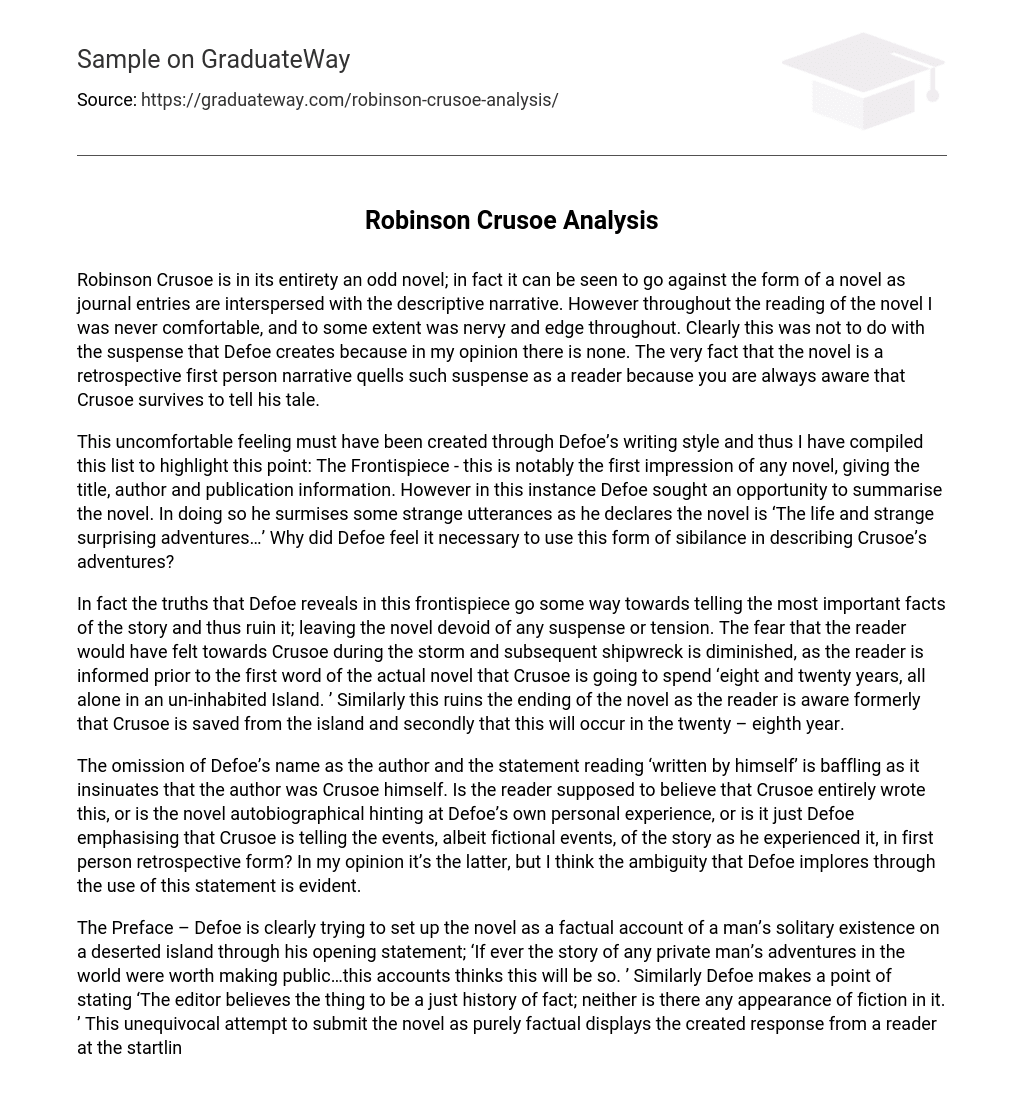Robinson Crusoe is a peculiar novel in its entirety, deviating from the typical format of a novel by incorporating journal entries alongside descriptive narrative. However, my experience of reading this novel was consistently uneasy and apprehensive. This feeling did not stem from the suspense that Defoe attempts to build, as I found none. The mere fact that the narrative is told in first person and in retrospect eliminates any sense of suspense, as the reader knows that Crusoe survives to recount his story.
Defoe’s writing style is responsible for the uncomfortable feeling experienced while reading his work. This is evidenced by the frontispiece of his novel, which provides essential information such as the title, author, and publication details. However, Defoe takes advantage of this opportunity to provide a summary of the novel, resulting in peculiar statements such as describing it as “The life and strange surprising adventures…” It is worth questioning why Defoe chose to use sibilance in describing Crusoe’s adventures.
Defoe’s frontispiece reveals important truths that spoil the story by eliminating suspense and tension. The reader is already aware of Crusoe’s fate before even starting the novel, as it is stated that he will spend twenty-eight years alone on an uninhabited island. This diminishes the fear and anticipation the reader would have felt during the storm and shipwreck. Furthermore, it ruins the ending by revealing that Crusoe will be saved from the island in his twenty-eighth year.
The omission of Defoe’s name as the author and the statement reading ‘written by himself’ is perplexing because it suggests that Crusoe was the author. Does the reader believe that Crusoe wrote the entire novel, or is it autobiographical, hinting at Defoe’s own experiences? Or is Defoe emphasizing that Crusoe is narrating the events in a first-person retrospective form, even though they are fictional? Personally, I think it’s the latter, but the ambiguity that Defoe creates with this statement is clear.
The Preface – Defoe attempts to establish the novel as a true story of a man’s isolated life on an uninhabited island with his opening statement: ‘If ever the story of any private man’s adventures in the world were worth making public…this accounts thinks this will be so.’ Similarly, Defoe asserts ‘The editor believes the thing to be a just history of fact; neither is there any appearance of fiction in it.’ This resolute endeavor to present the novel as entirely based on facts elicits a reader’s astonishment at the extraordinary nature of this being an actual account.
Defoe’s assertion that presenting the story as factual engenders a more authentic and intense reaction from the reader is accurate. This approach enables the reader to contemplate their own sense of identity and prompts them to consider how they would handle the same situation as Crusoe. The incorporation of personal pronouns, such as ‘I’, in the early sections of the novel enhances its autobiographical quality. Defoe seeks to establish a personal connection between the reader and Crusoe, laying the groundwork for comprehension and empathy towards his character and initial voyages.
In the later parts of the novel, the arrival of Friday causes a significant transformation in both the narrative perspective and Crusoe’s sense of self. The change from using the pronoun ‘I’ to ‘we’ marks a distinct shift in the novel as Crusoe becomes not only the provider but also the overseer and teacher for Friday. Additionally, the inclusion of a journal in the novel adds another layer of depth and realism. The use of a diary to document the events experienced by a lonely shipwrecked survivor effectively portrays the struggle to maintain sanity in such a situation.
However, when placed within a narrative of events, this stylistic device becomes more unusual. The unexpectedness of the diary entries is both a welcome change to the previous narrative and creates a heightened sense of the grave situation that Crusoe now faces. Indeed, the very first entry in this journal is full of melancholy: “I, poor, miserable Robinson Crusoe, being shipwrecked… came on shore… ‘the Island of Despair’… ship’s company being drowned, and myself almost dead.” The severity of Crusoe’s situation is also emphasized by his inability to continue with his journal: “…my ink began to fail me, and so I contented myself to use it more sparingly, and to write down only the most remarkable events of my life, without continuing a daily memorandum of other things.” The ink in this quote symbolizes Crusoe’s basic amenities, because if he does not act, his food supply will also run out. This is interesting in the context of postcolonialism because throughout the novel, Crusoe is portrayed as morally sound; he gives money to those who have helped him in the past and saves the hostages whom the savages have captured.
The novel has a clear postcolonial perspective, despite this. The purpose of the voyage that led to Crusoe being stranded on the island was to acquire slaves for the Brazilian plantations. These themes of slavery and the evident dominance of white Europeans over Africans are present throughout the novel. Even when Friday is introduced, Crusoe takes on a leadership role and Friday becomes subservient to him.
Defoe’s depiction of the ‘other’ as savages presents them as wild and untrustworthy, inviting readers to examine their own morals and societal identity. This prejudice against Africans reinforces eighteenth-century society’s preconceptions of the ‘other’. These themes make the novel uncomfortable or intriguing to readers from both the eighteenth and twenty-first centuries.





